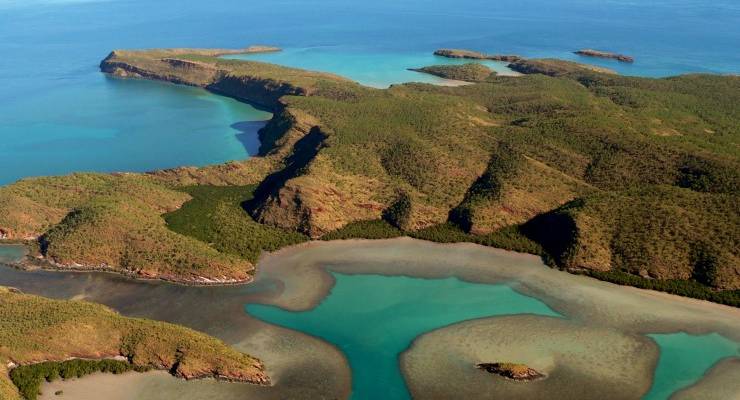
Back in July, Environment Minister Tanya Plibersek released the terrifying State of the Environment report — put together in 2021 but delayed under the previous government — which featured a clear message: Australia needs to take better advantage of land-management knowledge accrued over tens of thousands of years by First Nations peoples. “The environment is poorer because of the lack of Indigenous leadership, knowledge and management,” it stated.
We may be seeing a long-overdue acknowledgment of that knowledge. As the Worm mentioned this morning, between them, the Western Australia and Queensland governments have handed back nearly 10,000 square kilometres of ancestral lands to Indigenous communities in recent weeks.
WA has put in place the first marine parks co-designed by traditional owners and government in Australia. The three new marine parks, Bardi Jawi Gaarra, Mayala and Maiyalam, are part of the Buccaneer Archipelago, nearly 2000km north of Perth. Management of the area — home to several threatened species and wonders such as the vertical falls — will be led by Indigenous rangers, who will control fires, look after biodiversity, protect Indigenous cultural sites and teach Indigenous land-management skills.
In Queensland, there is Apudthama National Park and Yamarrinh Wachangan Islands National Park, which will also be co-managed by a corporation representing three local Indigenous communities and the state government. These areas are part of the 362,000 hectares of land handed back to the Gudang Yadhaykenu, Atambaya and Angkamuthi peoples after a 27-year fight. In Cape York, it has gone a step further, with 430 square kilometres returned to Indigenous communities as freehold land, giving them total ownership.
None of this exonerates the governments in Western Australia or Queensland for anything else, obviously. But these moves lock in practices that have worked for tens of thousands of years and increase the capacity of Indigenous groups to push back on issues like mining expansion on their land.
Beyond that, they go some small way towards repairing the irreparable — the severing of ties with family, culture and land that comes with colonisation.
As Gudang Yadhaykenu elder Nicholas Thompson-Wymarra put it at the ceremony for the return of some of the sacred lands:
We’re the saltwater and freshwater river people, and as sand beach people it’s been great to be able to have the opportunity to revive our dreaming again, for who we are and our identity. And who we are … has been lost for many decades due to the past dark history that’s happened here. It’s such a wonderful feeling — I’m feeling on top of the world.








Returning one million hectares or two and half million acres to traditional owners seems like a win-win. However the idea that they were the eternal custodians of the land before colonisation is patently wrong. Australia was around in a fairly modern form re climate, fauna and flora, for at least 20 million years before humans settled here 60,000 years ago. And it was doing alright by itself without custodians. What modern Aboriginal custodians can do is keep down the introduced feral animals and weeds from the last couple of hundred years.
Are you sure that’s all modern Aboriginal custodians can do, StBob64? Wouldn’t you also like them to clean your swimming pool and wash your car?
Multi-tasking? Why not.
It’s the Horizontal Falls, not the Vertical Falls.
Good point. Nothing wondrous about vertical falls.
“Control fires, look after biodiversity, protect indigenous sites . . . and teach Indigenous land management skills.”
It is the latter task that intrigues. Does it suggest access to indigenous skills that are comparable or superior to those european skills developed, or as previously understood, from much earlier times and much larger european populations? The key word of course is “indigenous”. Surely land management projects present, future skills as a priority. No matter whence the origin?
Freehold title doesn’t prevent mining. Ownership by a group does not enable an individual to obtain a housing loan on the land (but I could be wrong). It does let them keep people out, to isolate themselves, if they wish. If the state governments pay for the Rangers, etc, then that’s at least one good thing. If the Title is owned by, say, 100 people they can subdivide it into 100 smaller Titles, assuming they get permission from the local government without rezoning. I suspect the small print being to the new owners’ detriment.